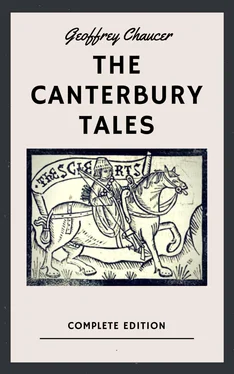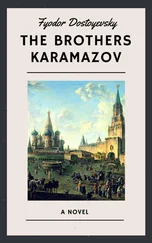For which Diana wrought them care and woe.
There saw I many another wondrous story,
The which me list not drawen to memory.
This goddess on an hart full high was set*, *seated
With smalle houndes all about her feet,
And underneath her feet she had a moon,
Waxing it was, and shoulde wane soon.
In gaudy green her statue clothed was,
With bow in hand, and arrows in a case*. *quiver
Her eyen caste she full low adown,
Where Pluto hath his darke regioun.
A woman travailing was her beforn,
But, for her child so longe was unborn,
Full piteously Lucina <54> gan she call,
And saide; "Help, for thou may'st best of all."
Well could he painte lifelike that it wrought;
With many a florin he the hues had bought.
Now be these listes made, and Theseus,
That at his greate cost arrayed thus
The temples, and the theatre every deal*, *part <55>
When it was done, him liked wonder well.
But stint* I will of Theseus a lite**, *cease speaking **little
And speak of Palamon and of Arcite.
The day approacheth of their returning,
That evereach an hundred knights should bring,
The battle to darraine* as I you told; *contest
And to Athens, their covenant to hold,
Hath ev'reach of them brought an hundred knights,
Well-armed for the war at alle rights.
And sickerly* there trowed** many a man, *surely <56> **believed
That never, sithen* that the world began, *since
For to speaken of knighthood of their hand,
As far as God hath maked sea and land,
Was, of so few, so noble a company.
For every wight that loved chivalry,
And would, *his thankes, have a passant name*, *thanks to his own
Had prayed, that he might be of that game, efforts, have a
And well was him, that thereto chosen was. surpassing name*
For if there fell to-morrow such a case,
Ye knowe well, that every lusty knight,
That loveth par amour, and hath his might
Were it in Engleland, or elleswhere,
They would, their thankes, willen to be there,
T' fight for a lady; Benedicite,
It were a lusty* sighte for to see. *pleasing
And right so fared they with Palamon;
With him there wente knightes many one.
Some will be armed in an habergeon,
And in a breast-plate, and in a gipon*; *short doublet.
And some will have *a pair of plates* large; *back and front armour*
And some will have a Prusse* shield, or targe; *Prussian
Some will be armed on their legges weel;
Some have an axe, and some a mace of steel.
There is no newe guise*, but it was old. *fashion
Armed they weren, as I have you told,
Evereach after his opinion.
There may'st thou see coming with Palamon
Licurgus himself, the great king of Thrace:
Black was his beard, and manly was his face.
The circles of his eyen in his head
They glowed betwixte yellow and red,
And like a griffin looked he about,
With kemped* haires on his browes stout; *combed<57>
His limbs were great, his brawns were hard and strong,
His shoulders broad, his armes round and long.
And as the guise* was in his country, *fashion
Full high upon a car of gold stood he,
With foure white bulles in the trace.
Instead of coat-armour on his harness,
With yellow nails, and bright as any gold,
He had a beare's skin, coal-black for old*. *age
His long hair was y-kempt behind his back,
As any raven's feather it shone for black.
A wreath of gold *arm-great*, of huge weight, *thick as a man's arm*
Upon his head sate, full of stones bright,
Of fine rubies and clear diamants.
About his car there wente white alauns*, *greyhounds <58>
Twenty and more, as great as any steer,
To hunt the lion or the wilde bear,
And follow'd him, with muzzle fast y-bound,
Collars of gold, and torettes* filed round. *rings
An hundred lordes had he in his rout* *retinue
Armed full well, with heartes stern and stout.
With Arcita, in stories as men find,
The great Emetrius the king of Ind,
Upon a *steede bay* trapped in steel, *bay horse*
Cover'd with cloth of gold diapred* well, *decorated
Came riding like the god of armes, Mars.
His coat-armour was of *a cloth of Tars*, *a kind of silk*
Couched* with pearls white and round and great *trimmed
His saddle was of burnish'd gold new beat;
A mantelet on his shoulders hanging,
Bretful* of rubies red, as fire sparkling. *brimful
His crispe hair like ringes was y-run,
And that was yellow, glittering as the sun.
His nose was high, his eyen bright citrine*, *pale yellow
His lips were round, his colour was sanguine,
A fewe fracknes* in his face y-sprent**, *freckles **sprinkled
Betwixte yellow and black somedeal y-ment* *mixed <59>
And as a lion he *his looking cast* *cast about his eyes*
Of five and twenty year his age I cast* *reckon
His beard was well begunnen for to spring;
His voice was as a trumpet thundering.
Upon his head he wore of laurel green
A garland fresh and lusty to be seen;
Upon his hand he bare, for his delight,
An eagle tame, as any lily white.
An hundred lordes had he with him there,
All armed, save their heads, in all their gear,
Full richely in alle manner things.
For trust ye well, that earles, dukes, and kings
Were gather'd in this noble company,
For love, and for increase of chivalry.
About this king there ran on every part
Full many a tame lion and leopart.
And in this wise these lordes *all and some* *all and sundry*
Be on the Sunday to the city come
Aboute prime<60>, and in the town alight.
This Theseus, this Duke, this worthy knight
When he had brought them into his city,
And inned* them, ev'reach at his degree, *lodged
He feasteth them, and doth so great labour
To *easen them*, and do them all honour, *make them comfortable*
That yet men weene* that no mannes wit *think
Of none estate could amenden* it. *improve
The minstrelsy, the service at the feast,
The greate giftes to the most and least,
The rich array of Theseus' palace,
Nor who sate first or last upon the dais.<61>
What ladies fairest be, or best dancing
Or which of them can carol best or sing,
Or who most feelingly speaketh of love;
What hawkes sitten on the perch above,
What houndes liggen* on the floor adown, *lie
Of all this now make I no mentioun
But of th'effect; that thinketh me the best
Now comes the point, and hearken if you lest.* *please
The Sunday night, ere day began to spring,
When Palamon the larke hearde sing,
Although it were not day by houres two,
Yet sang the lark, and Palamon right tho* *then
With holy heart, and with an high courage,
Arose, to wenden* on his pilgrimage *go
Unto the blissful Cithera benign,
I meane Venus, honourable and digne*. *worthy
And in her hour <62> he walketh forth a pace
Unto the listes, where her temple was,
And down he kneeleth, and with humble cheer* *demeanour
And hearte sore, he said as ye shall hear.
"Fairest of fair, O lady mine Venus,
Daughter to Jove, and spouse of Vulcanus,
Thou gladder of the mount of Citheron!<41>
For thilke love thou haddest to Adon <63>
Have pity on my bitter teares smart,
And take mine humble prayer to thine heart.
Alas! I have no language to tell
Th'effecte, nor the torment of mine hell;
Mine hearte may mine harmes not betray;
I am so confused, that I cannot say.
Читать дальше












